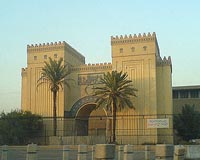| . |  |
. |
Al-Zuhoor, Iraq (AFP) Nov 25, 2009 Squeezed between a rubbish dump and a dry riverbed, Al-Zuhoor has no clean water or electricity and the gypsies who live here are at the margins of the new, ultra-conservative Iraq. In smelly alleys bordered by brick hovels, without glass windows or doors, men wander without work, a young girl plays on a squeaky swing and women return from a day's begging in Diwaniyah, 180 kilometres (110 miles) south of Baghdad. In the distance, smoke from burning rubbish blackens the sky and, when the wind turns, the nauseous odour is overwhelming. Before 2003, under the Baathist regime of Saddam Hussein, the situation was much better. The dictator's iron fist did not weigh on the gypsies or Roma. The men were professional singers or musicians and the women were invited to dance at feasts, weddings and parties in Iraq, having migrated to the Middle East from India centuries ago. With the rise of radical Islamists in 2004 however, they were marginalised, attacked and robbed by the Mahdi army, a Shiite militia loyal to the radical, anti-US cleric Moqtada al-Sadr, who regarded the gypsies as morally repugnant. Today, with the war-torn country primarily run by religious leaders, as opposed to the mostly secular society that existed under Saddam, the Roma community feels ostracised. Despite being Muslims, the "Kawliya" -- as the community is known in Iraq -- are seen as outcasts. "We live worse than dogs," says Ragnab Hannumi Allawi, a villager, wearing a sombre, piercing black look, surrounded by a group of women and sitting on a dusty carpet. She now refuses to go to Diwaniyah, capital of the eponymous province, to seek help. "The authorities say 'you are entitled to nothing' and throw us out. When we go into the city to buy food, they refuse us." The only thing these women can do to beg a few dinars is to cover their face entirely to avoid being recognised. "We leave at 5:00 am and we return around 3:00 pm, for two years they have been shutting all the doors on us and they kept us agonising," says Lamia Hallub, her face broken. The men, meanwhile, remember with nostalgia the weddings and events where they played and sang at night for rich families. Before 2003 "we could work in music and folk festivals," says Khalid Jassim, his head dressed in a red and white checked Keffiyeh. "But since we have had nothing. Why? Because our traditions do not accord with Islamic values," the old man complains. "They say to us that the artists have no place in Iraq. The art is finished, but what country is there without artists?" he says, his voice rising and mood becoming more animated. "Give me any job -- military, police, security or worker." In the face of regular attacks, police installed checkpoints at the village entrance, but despite this many gypsies left. "In the village, the infrastructure was destroyed, including the water network and the electricity," explains Abbas al-Sidi, a member of the province's Human Rights Commission. "The attacks, mostly by armed militias, forced the families to flee to other provinces. The number of families has fallen from 450 to 120. Those who remain are the poorest." The number of Roma in Iraq, according to tribal chiefs, is estimated at 60,000. Their hopes of a better life in the country with a population of 30 million people appear slim. "Islam considers them to be deviants," declares Hafiz Mutashar, a religious dignitary in Diwaniyah. "They commit prostitution which is forbidden under Islam. It is normal that our community considers them inferior and insists that they be isolated."
Share This Article With Planet Earth
Related Links All About Human Beings and How We Got To Be Here
 Google to digitise Iraq Museum archives: CEO
Google to digitise Iraq Museum archives: CEOBaghdad (AFP) Nov 24, 2009 US Internet giant Google will soon begin digitising artefacts and documents at Iraq's National Museum, its chief executive said in Baghdad on Tuesday. Eric Schmidt, on the last day of a three-day tour of the country, told reporters that some 14,000 digital images taken at the museum would be freely available online from the beginning of next year. "Google's mission all over the world is ... read more |
|
| The content herein, unless otherwise known to be public domain, are Copyright 1995-2009 - SpaceDaily. AFP and UPI Wire Stories are copyright Agence France-Presse and United Press International. ESA Portal Reports are copyright European Space Agency. All NASA sourced material is public domain. Additional copyrights may apply in whole or part to other bona fide parties. Advertising does not imply endorsement,agreement or approval of any opinions, statements or information provided by SpaceDaily on any Web page published or hosted by SpaceDaily. Privacy Statement |